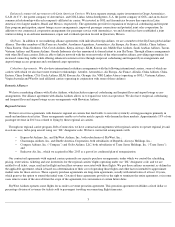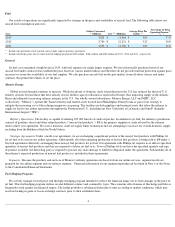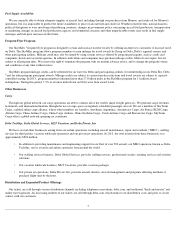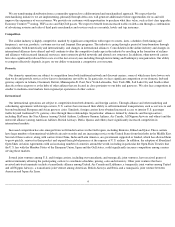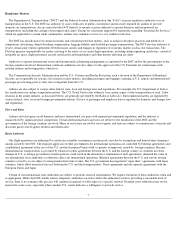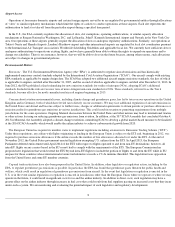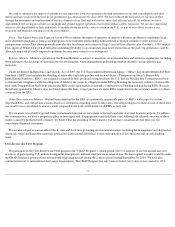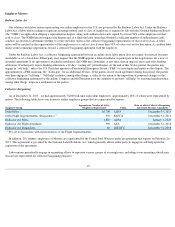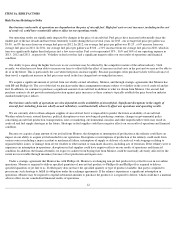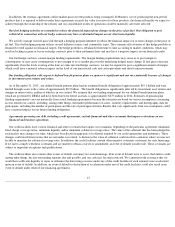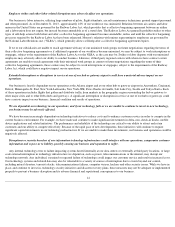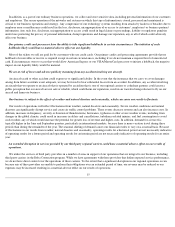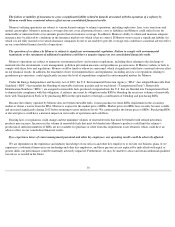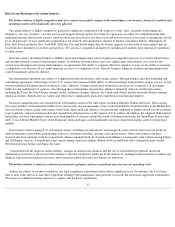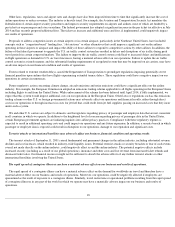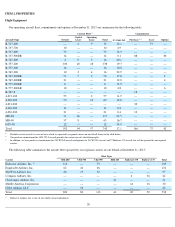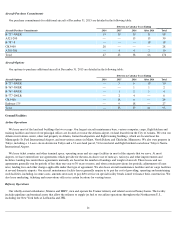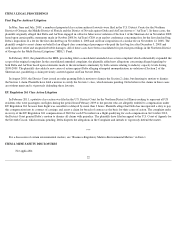Delta Airlines 2013 Annual Report Download - page 19
Download and view the complete annual report
Please find page 19 of the 2013 Delta Airlines annual report below. You can navigate through the pages in the report by either clicking on the pages listed below, or by using the keyword search tool below to find specific information within the annual report.
In addition, the strategic agreements utilize market prices for the products being exchanged. If Monroe's cost of producing the non-jet fuel
products that it is required to deliver under these agreements exceeds the value it receives for those products, the financial benefits we expect to
achieve through the ownership of the refinery and our consolidated results of operations could be materially adversely affected.
Our fuel hedging activities are intended to reduce the financial impact from changes in the price of jet fuel. Our obligation to post
collateral in connection with our hedge contracts may have a substantial impact on our short-term liquidity.
We actively manage our fuel price risk through a hedging program intended to reduce the financial impact on us from changes in the price of
jet fuel.
This fuel hedging program utilizes several different contract and commodity types. The economic effectiveness of this hedge portfolio is
frequently tested against our financial targets. The hedge portfolio is rebalanced from time to time according to market conditions, which may
result in locking in gains or losses on hedge contracts prior to their settlement dates and may have a negative impact on our financial results.
Our fuel hedge contracts contain margin funding requirements. The margin funding requirements may cause us to post margin to
counterparties or may cause counterparties to post margin to us as market prices in the underlying hedged items change. If fuel prices decrease
significantly from the levels existing at the time we enter into fuel hedge contracts, we may be required to post a significant amount of margin,
which could have a material adverse impact on the level of our unrestricted cash and cash equivalents and short-term investments.
Our funding obligation with respect to defined benefit pension plans we
sponsor is significant and can vary materially because of changes
in investment asset returns and values.
As of December 31, 2013 , our defined benefit pension plans had an estimated benefit obligation of approximately $19.1 billion and were
funded through assets with a value of approximately $8.9 billion . The benefit obligation is significantly affected by investment asset returns and
changes in interest rates, neither of which is in our control. We estimate that our funding requirement for our defined benefit pension plans,
which are governed by ERISA and have been frozen for future accruals, is approximately $675 million in 2014. Estimates of pension plan
funding requirements can vary materially from actual funding requirements because the estimates are based on various assumptions concerning
factors outside our control, including, among other things, the market performance of assets; statutory requirements; and demographic data for
participants, including the number of participants and the rate of participant attrition. Results that vary significantly from our assumptions could
have a material impact on our future funding obligations.
Agreements governing our debt, including credit agreements, include financial and other covenants that impose restrictions on our
financial and business operations.
Our credit facilities have various financial and other covenants that require us to maintain, depending on the particular agreement, minimum
fixed charge coverage ratios, minimum liquidity and/or minimum collateral coverage ratios. The value of the collateral that has been pledged in
each facility may change over time, which may be reflected in appraisals of collateral required by our credit agreements and indentures. These
changes could result from factors that are not under our control. A decline in the value of collateral could result in a situation where we may not
be able to maintain the collateral coverage ratio. In addition, the credit facilities contain other negative covenants customary for such financings.
If we fail to comply with these covenants and are unable to obtain a waiver or amendment, an event of default would result. These covenants are
subject to important exceptions and qualifications.
The credit facilities also contain other events of default customary for such financings. If an event of default were to occur, the lenders could,
among other things, declare outstanding amounts due and payable, and our cash may become restricted. We cannot provide assurance that we
would have sufficient liquidity to repay or refinance the borrowings or notes under any of the credit facilities if such amounts were accelerated
upon an event of default. In addition, an event of default or declaration of acceleration under any of the credit facilities could also result in an
event of default under other of our financing agreements.
13


